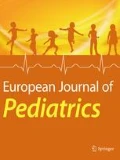Abstract
Colchicine is the treatment of choice in familial Mediterranean fever (FMF) for the prevention of both attacks and secondary amyloidosis. The overall nonresponder rate is about 5–10%. Anakinra is known to have good effectiveness in a severe autoinflammatory syndrome [chronic infantile neurological cutaneous and articular (CINCA) syndrome] and other recurrent hereditary periodic fevers. Pyrin—the protein involved in FMF—has a role in activating the proinflammatory cytokine interleukin (IL)-1β. We report the effectiveness of the addition of an IL-1-receptor inhibitor (anakinra) to colchicine in controlling the febrile attacks and acute phase response in an adolescent with FMF resistant to colchicine.
Case report
A 15-year-old girl with familial Mediterranean fever (FMF) was admitted to our hospital because of the persistence of recurrent fever attacks (twice a month), accompanied by chest and abdominal pain with headache, despite taking colchicine at a high dose (2 mg/kg per day). She suffered severe discomfort and complained of several school absences.
Acute phase reactants [erythrocyte sedimentation rate (ESR) 110, C-reactive protein (CRP) 43 mg%] and serum interferon-γ (125.4 pg/ml) were high during the crises. There was no proteinuria, but given the severity of the clinical picture, we performed a rectal biopsy to definitely exclude the presence of amyloidosis and it was negative.
Anakinra was started at 50 mg/day (1 mg/kg per day) subcutaneously, without stopping colchicine. Approval was obtained from an Ethics Committee (Burlo Garofolo Health Authority).
In the following 3 months the patient developed only three mild episodes of abdominal pain without fever, which resolved in a few hours. During these episodes acute phase reactants were negative. Moreover, serum interferon-γ was low (23 pg/ml).
After 3 months, anakinra was discontinued to confirm its real efficacy, without stopping colchicine. Following this interruption, the girl complained of eight fever attacks in 3 months accompanied by abdominal pain, vomiting, chest pain, and headache. Anakinra was reintroduced. Since then (15 months of follow-up), the patient has been in good health, without any fever attacks or abdominal or chest pain.
There have been no adverse effects due to anakinra, apart from minor local stinging and erythema at the injection sites, which gradually diminished.
Discussion
Colchicine is the recommended treatment of FMF since it can prevent the febrile attacks and the development of amyloidosis, even though a few patients develop amyloidosis also when on colchicine treatment [3, 5]. However, approximately one third of the patients have a partial remission and about 5–10% are nonresponders [3]; another 2–5% do not tolerate the drug well [3]. In single case reports several drugs (interferon-α, infliximab, thalidomide, etanercept) have been suggested as a possible alternative treatment for these cases [3, 6].
Anakinra is a recombinant form of the human interleukin (IL)-1-receptor antagonist that targets type I IL-1-receptor which is expressed in many tissues. There are some studies and case reports that show a good efficacy of anakinra in a severe autoinflammatory syndrome (CINCA, chronic infantile neurological cutaneous and articular syndrome) [2] and other recurrent hereditary periodic fevers [4]. Despite the elevated costs (approximately 50 € per 100 mg) its use appears justified in some inflammatory diseases that lack alternative treatments.
Since pyrin—the protein involved in FMF—activates the precursor form of IL-1β into its biologically active fragments there is a rationale for testing anakinra in FMF [1, 5]. Moreover, anakinra did appear to be effective in suppressing acute phase reactants in a patient with FMF (a nonresponder to the treatment with colchicine) and amyloidosis [1].
In our case, the addition of anakinra to colchicine had a dramatic therapeutic benefit without relevant side effects. As the febrile attacks recurred after discontinuing anakinra and disappeared again after reintroduction, we believe in the real therapeutic efficacy of this drug. In light of the present evidence [3, 5], colchicine should be continued in order to prevent further developments of amyloidosis.
References
Chae JJ, Wood G, Masters SL, Richard K, Park G, Smith JB, Kastner DL (2006) The B30.2 domain of pyrin, the familial Mediterranean fever protein, interacts directly with caspase-1 to modulate IL-1β production. Proc Natl Acad Sci USA 103:9982–9987
Goldbach-Mansky R, Dailey NJ, Canna SW, Gelabert A, Jones J, Rubin BI, Kim HJ, Brewer C, Zalewski C, Wiggs E, Hill S, Turner ML, Karp BI, Aksentijevich I, Pucino F, Penzak SR, Haverkamp MH, Stein L, Adams BS, Moore TL, Fuhlbrigge RC, Shaharm B, Jarvis JN, O’Neil K, Vehe RK, Beitz LO, Gardner G, Hannan WP, Warren RW, Horn W, Cole JL, Paul SM, Hawkins PN, Pham TH, Snyder C, Wesley RA, Hoffmann SC, Holland SM, Butman J, Kastner DL (2006) Neonatal-onset multisystem inflammatory disease responsive to interleukin-1β inhibition. N Engl J Med 355:581–592
Kallinich T, Haffner D, Niehues T, Huss K, Lainka E, Neudorf U, Schafer C, Stojanov C, Timmann C, Keitzer R, Ozdogan H, Ozen S (2007) Colchicine use in children and adolescents with familial Mediterranean fever: literature review and consensus statement. Pediatrics 119:e474–e483
Nevyjel M, Pontillo A, Calligaris L, Tommasini A, D’Osualdo A, Watheram HR, Granzotto M, Crovella S, Barbi E, Ventura A (2007) Diagnostic and therapeutic insights in a severe case of mevalonate kinase deficiency. Pediatrics 119:e523–e527
Ozen S (2003) Familial mediterranean fever: revisiting an ancient disease. Eur J Pediatr 162(7–8):449–454
Seyahi E, Ozdogan H, Celik S, Ugurlu S, Yazici H (2006) Treatment options in colchicine resistant familial Mediterranean fever patients: thalidomide and etanercept as adjunctive agents. Clin Exp Rheumatol 24(5 Suppl 42):S099–S103
Author information
Authors and Affiliations
Corresponding author
Rights and permissions
Open Access This is an open access article distributed under the terms of the Creative Commons Attribution Noncommercial License ( https://creativecommons.org/licenses/by-nc/2.0 ), which permits any noncommercial use, distribution, and reproduction in any medium, provided the original author(s) and source are credited.
About this article
Cite this article
Calligaris, L., Marchetti, F., Tommasini, A. et al. The efficacy of anakinra in an adolescent with colchicine-resistant familial Mediterranean fever. Eur J Pediatr 167, 695–696 (2008). https://doi.org/10.1007/s00431-007-0547-3
Received:
Accepted:
Published:
Issue Date:
DOI: https://doi.org/10.1007/s00431-007-0547-3

